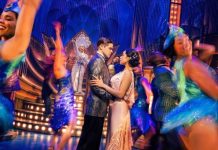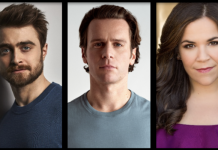On February 18, 1965, The Cambridge Union – the oldest continuously running free speech and debating society in the world, founded at England’s Cambridge University in 1815 – hosted a debate between two of America’s leading intellectuals: writer, speaker, and Civil Rights activist James Baldwin and elitist American conservative, author, and political commentator William F. Buckley, Jr. The event was recorded by NET and presented as a one-hour television special Debate: Baldwin vs. Buckley (which is still available for free online viewing), featuring their formal disputation of whether “The American Dream is at the Expense of the American Negro.”
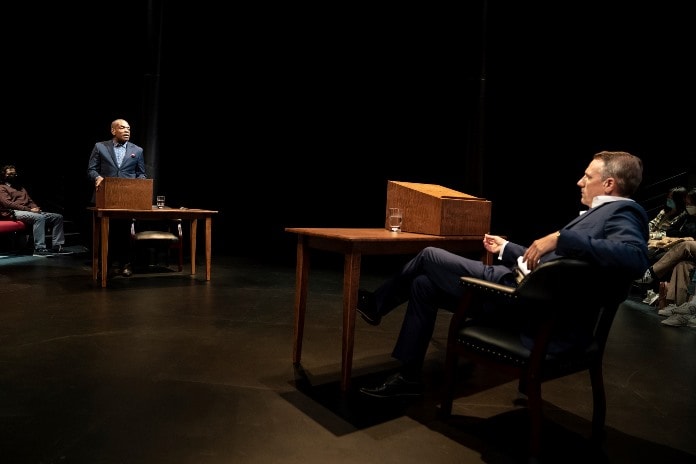
Inspired by the program and its theme of one of our country’s most divisive and resonant socio-political issues, performer and creator Greig Sargeant conceived the new play Baldwin and Buckley at Cambridge in conjunction with the ensemble theater company Elevator Repair Service (where he is a member and serves on the Board of Directors). Directed by ERS Founding Artistic Director John Collins, the show is now making its NYC debut Off-Broadway at The Public Theater, which has a long history of collaborating with the company and celebrating its commitment to the integrity of the source material.
Verbatim reenactments of televised programs of dialogues with James Baldwin concerning race relations in the US also have a recent history Off-Broadway, with Lessons in Survival: 1971 (based on an interview conducted by poet Nikki Giovanni for the TV show SOUL!, which, too, can be seen online) playing this past June at the Vineyard Theatre. Clearly, the man and his mission are of special interest in our current era, with many of the same unresolved problems continuing to plague a divided America.
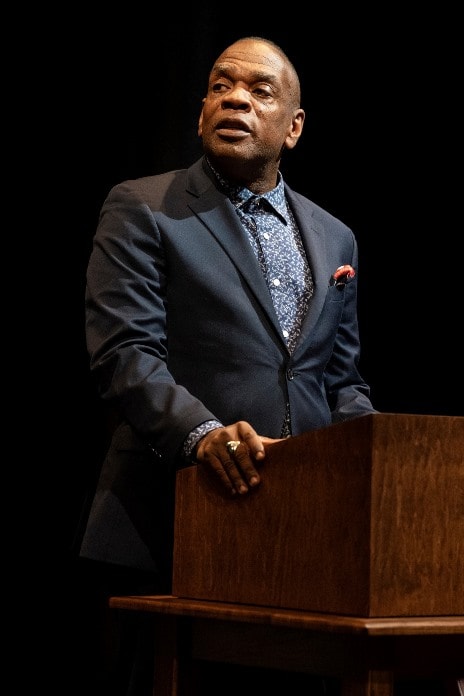
But the new ERS staged version of Baldwin and Buckley occasionally veers from a strictly word-for-word vintage-style presentation, with references to the show’s location at The Public, and accents, demeanors, and dress (costumes by Jessica Jahn and wigs by Earon Chew Nealey) of the real-life characters that conflate then and now, to underscore the obvious message to an already aware NYC audience (who could easily watch the original on YouTube) that the 57-year-old conversation could be happening here and now. It is, and they know.
The show, simply staged with two tables, tabletop lecterns, and chairs facing each other from opposite ends of the center of the theater and surrounded by stadium seating on three sides (scenic consulting by dots), opens, with house lights up (lighting by Alan C. Edwards), to a live introductory curtain speech, welcoming us, and the esteemed debaters, to The Public. It is followed by a brief voiceover of the actual 1965 introduction of the speakers at Cambridge and then comes to life as a mostly verbatim recreation of the legendary debate (save for some additional mentions of The Public throughout), with a preliminary pro-and-con discourse on the motion between two undergraduates – here dressed casually and speaking and gesturing in a decidedly post-modern American style, not with the formal attire, English accents, or control of the Cambridge students.
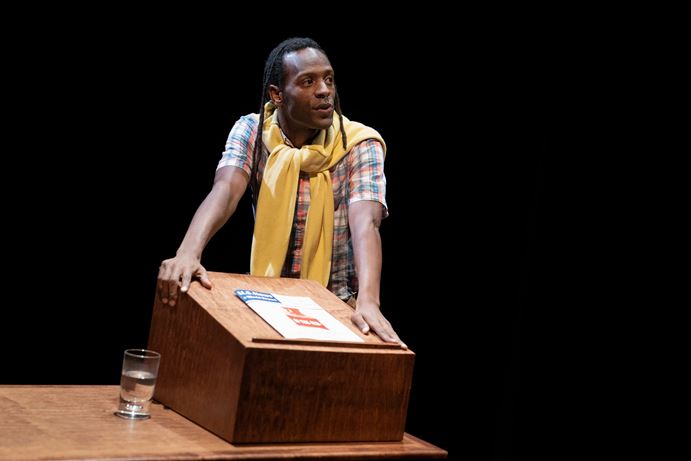
Both Matthew Russell (alternating with Gavin Price, who created the role) as Mr. Heycock and Christopher-Rashee Stevenson as Mr. Burford are more animated and emotive than the real-life originals. Stevenson’s performance is especially theatrical, and the appearance of a Black actor as the “con” voice in support of Buckley is presumably intended to take a jab at present-day outspoken BIPOC conservatives and/or at the pressure they feel to assume that stance in order to be accepted and to get ahead in our culture and/or a call for colorblind casting (the actual Burford was white).
Their short presentations are followed by the well-documented comments of the two renowned guest speakers. Starring Sargeant as Baldwin and Ben Jalosa Williams (who also provided the sound design) as Buckley, their opposing positions – Baldwin’s personal and pained, Buckley’s statistical and condescending, both characteristically eloquent and provocative – are delivered with more impassioned emotion and physical energy, and at a more fluid pace, than in the 1965 recording, with neither actor slipping into mere impersonation (save for a few funny moments by Williams). Standing and directly addressing the audience around them, they instead state their arguments with clarity and conviction, and react visibly to each other’s perspectives while listening seated at their respective tables (Sargeant’s facial expressions and posture indicate Baldwin’s suppressed anger, while those of Williams bespeak Buckley’s supercilious smugness), giving the intended renewed vitality and greater immediacy (if not the authentic realism) to the in-person exchange, in full color and light, than comes across remotely, in black and white, on a small screen.
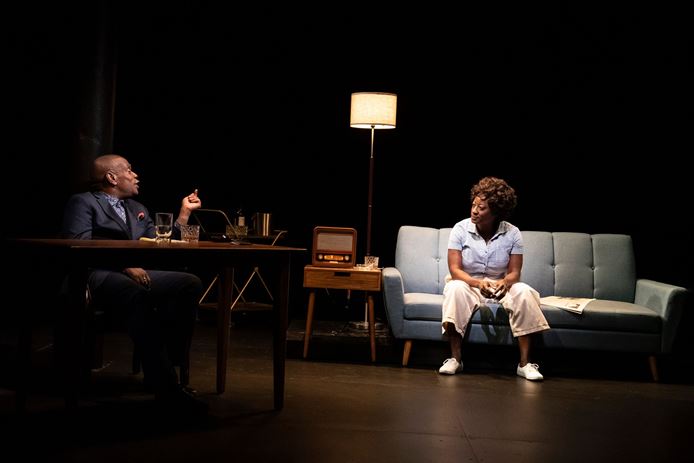
Following the speeches, the results of the attendees’ vote on which side of the motion has been adopted are read. No surprise there, even if you haven’t viewed the video or read about the iconic event. The debaters exit, the lights go down, and the play concludes with an additional, short, imagined scene, researched and written by Sargeant and ERS company member April Matthis, between Baldwin and his close friend Lorraine Hansberry (writer, activist, and the first Black woman to have a play performed on Broadway), played by Daphne Gaines (with Stephanie Weeks scheduled take over the role beginning on Tuesday, October 18, for all remaining performances). Set in a home interior with a sofa, lamp, table, and bar cart, the actors shift from the conversation and camaraderie of the historic figures to themselves, in a self-referencing metatheatrical break from character that yet again reiterates their contemporary message, as it pertains to society in general and the changing practices of theater in particular.
You can see the play now, or you can watch the original recording anytime. We can only hope that it won’t have to be revisited in another 60 years.
Running Time: Approximately 60 minutes, without intermission.
Baldwin and Buckley at Cambridge plays through Sunday, October 23, 2022, at The Public Theater, 425 Lafayette Street, NYC. For tickets (starting at $60, plus fees), go online. The use of masks is strongly encouraged at all performances and is required at all Tuesday evening and Saturday and Sunday matinee performances.




